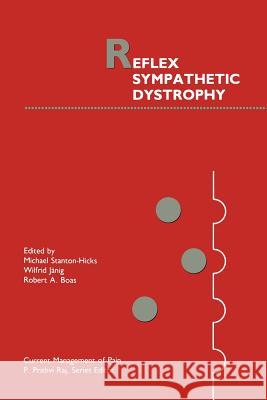Reflex Sympathetic Dystrophy » książka
Reflex Sympathetic Dystrophy
ISBN-13: 9781461280262 / Angielski / Miękka / 2011 / 210 str.
Painful disorders following injury ofperipheral nerves; bones and othersoft tissueshaveoccurredfrom theearliesttimesofhuman existence. Ambroise ParewascalledupontotreatthepersistentpainexperiencedbyKing Charles IXwhich wascausedbyalancetwound. Thepainwaspersistent, diffuseand associatedwithcontractureofmuscles. Thekingcouldneitherflexnorextend hisarmforamonth untilthepainfmally disappeared WeirMitchell, G.R.Moorehouse, andW.W.Keeneproducedamonumental treatisein 1864titled"GunshotWoundsandOtherInjuriesofNerves,"which containedan account ofsymptoms and signs ofperipheral nerve injuries as observed in Unionist Soldiers. After 1864, however, little mention ofthis condition wasmade during peacetimeuntil a spateofarticlesappearedagain afterWorldWarOneandTwo. With the formation ofsocieties such as International Association for the Study of Pain, renewed interest has been shown in understanding the mechanismsandmanagementofpainsyndromes. Paincausedbysympathetic disordershasalwayscaughtthefancyofclinicians, andyetconfusionexistsas tothe etiologyandpropertreatmentofreflexsympathetic dystrophy. Many new names have been proposed for these syndromes; recent ones include sympatheticallyornonsympatheticallymaintained pain. Taxonomy ofThe International Association for the Study ofPain lists causalgia and reflex sympathetic syndromes as two distinct entities. All clinicians seem to feel that pain relieved by a diagnostic sympathetic block should be labeled as causalgia or reflex sympathetic dystrophy. Similarly, numerous therapeuticmodalitieshavebeenproposed. Theyallcenteraround sympathetic denervation of some sort, pharmacologically, chemically, or surgically. Inspiteofagreatadvanceinourunderstandingofpainmechanism in the last quarter century, we are no closer to improving the outcome of patientswithsevere reflexsympatheticdystrophy. Etiologyand incidenceis xvi Serieseditorforeword still unclear. Diagnosis is made late and treatment is not standardized Clinicians whotreatcausalgiaandreflexsympatheticdystrophyhavedifferent treatmentsbasedupon their background and experience, ratherthan on the mechanism ofthesyndrome itself. ThetimeisopportunenowtogathersomeunbiasedthoughtsonRSDand clem- the air. Our editors, in particular Michael Stanton-Hicks, needto be congratulatedfor organizing a timely symposium onthesubject and inviting international expertsto discuss the pathophysiology and treatmentofRSD. Whatfollowsinthismonograph isaclear, concisepresentationanddiscussion ofnomenclature, etiology, incidence, mechanism, treatment, and outcome of











